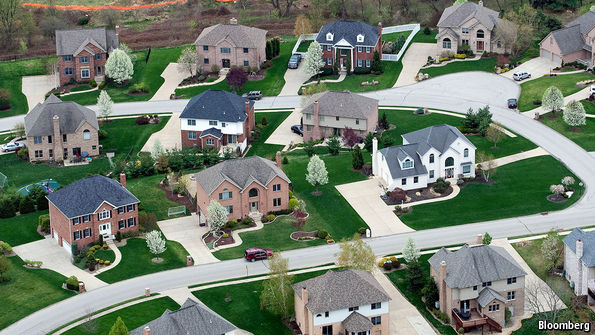Why Americans need to beware of becoming complacent

Dream. By Tyler Cowen. St Martin’s Press; 241 pages; $28.99.
AMERICA is the land of opportunity, they say. Inspired by the ambition of its Founding Fathers, its people revel in their dynamism. Diversity is their strength, as captured in the national motto—E pluribus unum (“Out of many, one”). Americans embrace change and reinvention, and this, they like to think, sets their country apart from Europe or Asia.
Tyler Cowen, an economist, believes that this ideal is self-indulgent nonsense. America is losing its vim, he says, and Americans are settling into stagnation. In his new book, “The Complacent Class”, Mr Cowen shows not only that Americans move less now, crossing state lines at around half the average rate that they did between 1948 and 1971, and stay longer in their jobs, but American entrepreneurialism is floundering too. Markets are becoming more concentrated. Fewer new companies are being started, and many struggle to grow. Even in the vaunted technology sector the creation and expansion of new firms peaked in 2000. Sluggish growth in productivity and living standards is making America more like Europe and Japan.
On the surface, Americans enjoy more choice than ever before. From over 1,400 types of music on Spotify, a music-streaming service, to a swipeable menu of dating options, and rare books available at the click of a button, consumers have never had it so good. But there is a dark side to being able to select the perfect product, neighbourhood or partner. Freedom to choose means that it is ever easier for people to marry, live near or school their children with other people of the same kind. In the South, the proportion of black students in majority-white schools was 44% in 1988; in 2011 that figure was 23%—lower than in 1968. Segregation by income has risen dramatically in the past few decades. The American elite might celebrate diversity in dinner-table conversation, but in practice Americans are cocooning themselves in enclaves of like-minded folk.
Segregation shuts off growth and stymies innovation. Poorer states used to be able to attract talented people by offering them a combination of promising job opportunities and cheaper housing. But now no one expects Louisiana to catch up with Silicon Valley. For the past few decades poorer states have been caught in a vicious circle, says Mr Cowen, where the expectation that they will not catch up makes it harder for them to do so.
When it comes to economic segregation, market forces are not helping, or at least not when they are combined with restrictions preventing the construction of more low-cost housing. A housing market that allocates the nicest housing to the highest bidder will inevitably push poor folk out of sight—and thus out of mind. Richer, well-educated people want to live near each other, and high house prices conveniently discourage poorer people from spoiling the view.
There will be consequences, says Mr Cowen. Hyman Minsky, an economist who grew up during the Great Depression, had a theory that financial stability would breed overconfidence, sowing the seeds of future instability. Largely ignored in his lifetime as he pushed against the prevailing wisdom that efficient markets would protect capitalist society against disaster, his idea became widely celebrated only after the financial crisis appeared to confirm it in 2007-08. Complacent financiers, regulators and central bankers allowed risk to build and put the whole system in danger.
Extending the idea to all society, as Mr Cowen does, is tricky because of the difficulty in telling the difference between complacency, contentment and submission. He is unclear who the complacent class really are, and who exactly is responsible for the mess. Are Americans betraying their history of reaching for the American dream, or are they suffering because of a rotten system? (Were the bankers greedy, or responding to incentives?)
Still, there is some truth to Mr Cowen’s diagnosis that America’s strength is undermined by its divisions and by a willingness to protect the powerful. Pockets of rich Americans and the lack of opportunity implied for those who are shut out of those pockets represent a festering problem, says Mr Cowen. In a crisis, the system’s creakiness will leave it ill-equipped to cope. In the final chapter he reveals his fear that the biggest story of the last 15 years is the growing likelihood that “a cyclical model of history will be a better predictor than a model of ongoing progress.”
The main question Mr Cowen raises is whether a dose of disorderliness will jolt America back to strength. He offers an optimistic scenario, in which driverless cars allow Americans to overcome the pain of having to commute over longer distances, or where global crises convince them that they should live for the moment. Artificial intelligence, clean cheap energy and alternatives to tranquillising opioids could all return America’s lost dynamism.
But the pessimism of his analysis sits uncomfortably with these rosy scenarios. Other, likelier forms of chaos include populist politicians bent on sowing division, or even international violence. The path from those to a restored, vibrant America seems longer and rockier. In cycles, things often go down before they go up.

